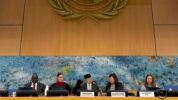Indonesia: No Clemency For Mary Jane Veloso, Denies Release
“Once the prisoner returns to their country and completes their sentence there, the responsibility for rehabilitation shifts to that country,” Yusril said.
“This means that after Mary Jane’s return to the Philippines, her treatment and further proceedings will be handled by the Philippine authorities,”
Addressing speculation about a potential reduction in Mary Jane’s sentence, Yusril noted that the decision to grant any form of clemency, such as a pardon or remission, lies entirely with the president of the country in question.
“In Mary Jane’s case, it’s possible that President Marcos could grant clemency and reduce her sentence to life imprisonment, as the death penalty has been abolished in the Philippines,” he added.
Yusril also reminded that former President Joko Widodo of Indonesia for 10 years in power has consistently rejected requests for clemency from both Mary Jane’s family and the Philippine government.
“President Jokowi has maintained a firm stance against granting clemency in drug-related cases,” he said.
The request for Mary Jane’s transfer was submitted to Indonesia by Philippine Justice Minister Jesus Crispin Remulla.
Yusril confirmed that the matter had been thoroughly discussed within Indonesian government departments and that President Prabowo Subianto had approved the prisoner transfer policy.
Yusril mentioned that the transfer of Mary Jane is expected to take place in December 2024. Other countries, including Australia and France, have also submitted similar requests for the transfer of their citizens convicted in Indonesia.
In response to a recent statement from President Marcos on social media, Yusril reiterated that the transfer of Mary Jane is a result of diplomatic negotiations and is not a sign of her release.



























Tinggalkan Balasan